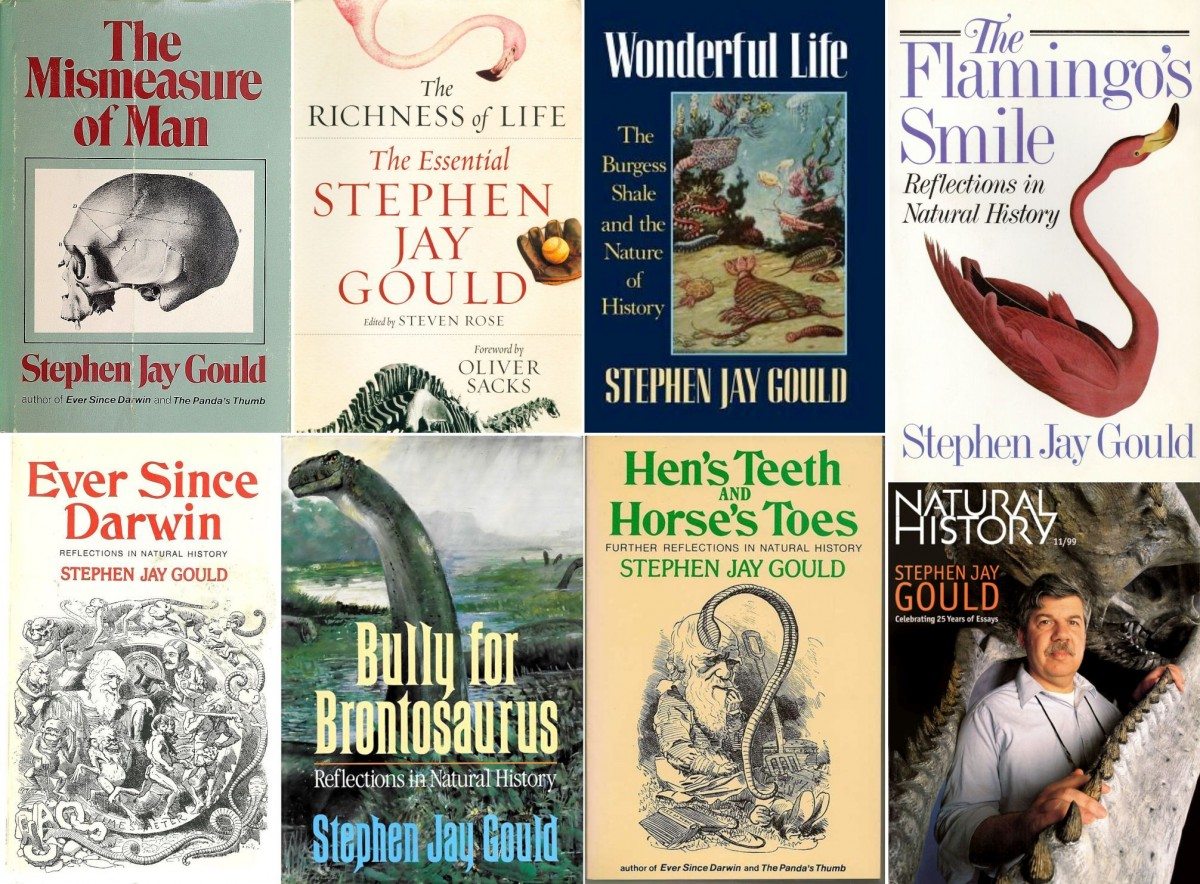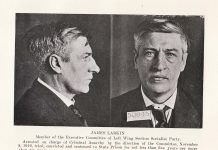
Forord
Stephen Jay Gould (10. september 1941 – 20. maj 2002) var en amerikansk biolog og palæontolog (læren om fortidige dyr og planter). Fra 1974 til 2001 skrev han et månedligt essay i tidsskriftet Natural History (300 i alt) om natur-, videnskabs-, geologisk og politisk historie. En del af disse essays blev senere samlet i en lang række bøger. Gould var i stadig polemik med det kristne højre (kreationisterne), som ikke anerkender Darwins udviklingslære eller anden videnskabelig erkendelse, ligesom han var en hård kritiker af den såkaldte biologiske determinisme, som tenderer mod at give en genetisk retfærdiggørelse af status quo og dermed accept af eksisterende klasse-, køns- og raceforskelle.
Nedenfor findes relevante sites, artikler, nekrologer og bøger – også – på dansk.
Bjarne A. Frandsen
November 2002.
Revideret september 2021.
Se også på Socialistisk Bibliotek:
- Linkbox: Kampen om Darwin
- Linkbox: Charles Darwins ’Arternes oprindelse’, 1859
- Linkbox: Marx og Darwin
- Emneoversigten: Naturvidenskab / Science
Biografier, bøger, sites, videoer (Biographies, books, sites, videos)
Wikipedia.dk
- Stephen Jay Gould
Kortere dansk leksikal artikel.
Den Store Danske
- Stephen Jay Gould
Dansk leksikal artikel.
Libcom
- Stephen Jay Gould
With articles by/about Gould.
Stanford Presidental Lectures and Symposia in the Humanities and Arts
- Stephen Jay Gould (online at Internet Archive)
With Biografi, Bibliografi, Interviews and Reviews.
The Unofficial Stephen Jay Gould Archive (online at Internet Archive)
Comprehensive site about Gould. See Biography, Bibliography and Sitemap.
Wikipedia, the free encyclopedia
- Stephen Jay Gould
Contents: Gould as known to the general public – Gould as a biologist – Other topics – References – External links.
See also: Books by Stephen Jay Gould. - Punctuated equilibrium
Se også: Livets springende udvikling: en historie om evolution og massedød (pdf). Af Carsten Rabæk Kjaer og Erik Thomsen (Aktuel Naturvidenskab, nr.1, 1999, s.30-33)
YouTube.com
- Stephen Jay Gould: with many interviews.
- See here: Stephen Jay Gould on Intelligence Tests (IQ), the Nature – Nurture Controversy 1995 (7:24 min.). “He challenges the methodological accuracy of ‘The Bell Curve’ (1994), by Richard Herrnstein and Charles Murray, which represented the arguments of what Gould terms biological determinism.”
The Science and Humanism of Stephen Jay Gould
By Richard York and Brett Clark (Monthly Review Press, 2011, 223 p.).
See:
- The dialectics of Stephen Jay Gould: contingency, convergence and spandrels (Cosmonaut, July 7, 2022). Interview with Richard York.
- Chapter: Natural history and the nature of history (pdf) (Links: International Journal of Socialist Renewal, 26 January 2011).
- Chapter: Stephen Jay Gould’s critique of progress (Monthly Review, Vol.62, No.9, February 2011).
- Review by Paul McGarr (Socialist Review, Issue 356, March 2011).
- Review by Phil Gasper (New Politics, Issue 52, Winter 2012).
Stephen Jay Gould: Reflections on His View of Life
Edited by Warren D. Allmon, Patricia H. Kelley, and Robert M. Ross (New York, Oxford University Press, 2008, 416 p.). Chapter 15: Bibliography compiled by Warren D. Allmon (p.335-379).
See:
- Introduction: The structure of Gould: happenstance, humanism, history, and the unity of his view of life, by Warren D. Allmon (pdf) (p.3-68, online at Internet Archive)
- Richard York: Gouldiana rising (Monthly Review, Vol.61, No.5, October 2009).
The Richness of Life: The Essential Stephen Jay Gould
Edited by Steven Rose and Paul McGarr (Jonathan Cape, 2006, 656 p.).
See:
- Extraordinary Life. Interview with Steven Rose (Socialist Review, Issue 307, June 2006).
Nekrologer og artikler om S.J. Gould / Obituaries and articles about S.J. Gould
Against the Current
Ansar Fayyazuddin: An appreciation of Stephen Jay Gould (Issue 99, July-August 2002, p.41-43).
“As an evolutionary biologist Gould is best known for his joint work with Niles Eldredge on the theory of ‘punctuated equilibrium’. Gould and Eldredge made a radical break with standard Darwinian lore, according to which evolution is a continuous process in which gradual changes over long periods of time account entirely for the immense biological diversity that we see around us. Instead they posited that the ‘missing links’ in the fossil record connecting differnt species are not empty slots waiting only to be filled by diligent paleontologists, but evidence that there are no ‘missing links’ – that far from being a continuous incremental process, evolution proceeds in fits and starts, where long periods of relative stability are disrupted by bursts of (relatively) rapid cataclysmic change.”
CounterPunch
Jeffrey St. Clair: Farewell, Stephen Jay Gould (24 May 2002).
“Gould was an engaged academic in the best sense. He used his formidable intellect and sharp prose to lay waste to charlatans who sought to use pseudo-science for malign political purposes. At the top of the list was Charles Murray, the right-wing sociologist, whose racist tract ‘The Bell Curve’ sought prove that blacks were intellectually inferior to whites and genetically incapable of leading productive lives. It became a manifesto for the Gingrich right in the early 90s, on the rampage to destroy what remained of the federal government’s social welfare system and justify its own racist policies.”
In Defence of Marxism
Lorenzo Esposito and Emanuele Cullora: Marx, Darwin and Gould: The revolution of evolution (31 August 2012).
“The entire life of Stephen Jay Gould as a scientist was spent in developing the Darwinian theories of evolution and in enriching them with a dialectical method.”
Fred Weston: A tribute to a great scientist (22 May 2002).
“Gould made a major contribution to development of modern science with his theories on evolution. Prior to his studies scientists had accepted Darwin’s view of a very slow and gradual process of evolution. Together with Eldredge in the early 1970s, beginning with a study of land snail shells, he discovered that there was another pattern to the evolutionary process. They saw that what the fossil records showed was not one continuous gradual process, but a series of sudden bursts of change followed by relatively long periods of very slow development. Gould and Eldredge coined the term ‘punctuated equilibria’ to describe this process.”
International Socialism
Paul McGarr: Revolutions in evolution: Stephen Jay Gould in perspective (Issue 100, Autumn 2003, p.81-112).
“Evolution has been politically contentious ever since Darwin developed his theory of natural selection. Paul McGarr summarises the work of Stephen Jay Gould, one of science’s greatest popularisers, and the scourge of reactionaries and reductionists everywhere.”
International Socialist Review
Phil Gasper: Stephen Jay Gould: dialectical biologist (Issue 24, July-August 2002).
“Every major newspaper carried an obituary of Gould after his death, praising his scientific accomplishments. But most said nothing about another important aspect of Gould’s life – his radical politics … Gould’s politics were clearly an important aspect of his life, but more than this they had an important influence on his scientific work. This was most obvious in Gould’s decision to devote a considerable amount of his time to combating scientific racism, biological determinism, and other attempts to misuse biology to justify social inequality and the status quo.”
Jacobin: Reason in Revolt
Matthew Lau: Remeasuring Stephen Jay Gould (20 May 2017).
“Fifteen years after his death, Stephen Jay Gould’s ideas have never been more vital.”
Klassekampen: Venstresidas dagsavis
Knut Johansen: Stephen Jay Gould (1941-2002) (23. maj 2002).
“Med Stephen Jay Goulds død er en av de mest innflytelsesrike og omstridte blant samtidens evolusjonsteoretikere og en av de siste tiårenes mest avholdte populærvitenskapelige forfattere gått bort.”
Monthly Review
Richard York and Brett Clark: Stephen Jay Gould’s critique of progress (Vol.62, No.9, February 2011).
“Questions about the nature of history go to the heart of assumptions buried in Western culture, and Gould was a major critic of the biases that assume a progressive nature to history and the inevitability of the present.”
Richard York and Brett Clark: Debunking as positive science: reflections in honor of the 25th anniversary of Stephen Jay Gould’s The mismeasure of man (Vol.57, No.9, February 2006).
“In the finest tradition of Marx, the late Stephen Jay Gould, paleontologist, evolutionary theorist, and dialectical scientist, one-quarter century ago, in 1981, published the first edition of the landmark book, The Mismeasure of Man. Gould provides a devastating critique of the right-wing (pseudo-) science of classifying individuals on a one-dimensional scale of supposed inherent intellectual worth.”
Richard York and Brett Clark: Natural history and the nature of history Vol.57, No.7, December 2005).
“Running counter to much of prevailing thought, one of Gould’s central themes is that of historical contingency – events often occurring effectively by chance and that are not predictable before hand (although they may be rendered sensible in hindsight) may change the course of history, foreclosing some options and opening others.”
Richard C. Lewontin and Richard Levins: Stephen Jay Gould: what does it mean to be a radical? (Vol.54, No.6, November 2002).
“The public intellectual and political life of Steve Gould was extraordinary, if not unique. First, he was an evolutionary biologist and historian of science whose intellectual work had a major impact on our views of the process of evolution. Second, he was, by far, the most widely known and influential expositor of science who has ever written for a lay public. Third, he was a consistent political activist in support of socialism and in opposition to all forms of colonialism and oppression.”
Richard York: Homo Floresiensis and human equality: enduring lessons from Stephen Jay Gould (Vol.56, No.10, March 2005).
“The discovery by a team of Indonesian and Australian researchers of the remains of a previously unknown species of hominid, ‘Homo floresiensis’, on the Indonesian island of Flores was characterized by some scholars as the greatest discovery in anthropology in a half-century … Despite the unusual character of this find, should we be surprised that our genus, Homo, spawned a dwarf species that was contemporaneous with ‘Homo sapiens’ for a long stretch of our evolutionary history? The late Stephen Jay Gould, renowned dialectical biologist and evolutionary theorist, would surely have said no.”
New Politics
Phil Gasper: The dialectical biologist (Vol.13, No.4, Whole No.52, Winter 2012, p.122-127). Review of Richard York and Brett Clark, The Science and Humanism of Stephen Jay Gould (Monthly Review Press, 2011).
“Richard York and Brett Clark have written an accessible introduction to Gould’s work. They divide their book into two parts. In the first four chapters they discuss Gould’s contributions to evolutionary theory and his distinctive views about the history of life. In chapters 5 through 8 they look at Gould’s views about the human condition, including his critiques of biological determinism and his defense of human equality.”
Clive Bradley: Stephen Jay Gould: an appreciation (Vol.9, No.4, Whole No.36, Winter 2004, p.110-120).
“Stephen Jay Gould, the palaeontologist and science writer who died last year, wrote – brilliantly – on a bewildering series of subjects, but he is perhaps best known for his contribution to four: general evolutionary theory; the sociobiology debate; the relationship between science and religion; and the study (or critique of it) of intelligence testing.”
PloS Biology
The mismeasure of science: Stephen Jay Gould versus Samuel George Morton on skulls and bias (June 7, 2011).
“Morton was considered the objectivist of his era, but Gould reanalyzed Morton’s data and in his prize-winning book The Mismeasure of Man argued that Morton skewed his data to fit his preconceptions about human variation. Morton is now viewed as a canonical example of scientific misconduct. But did Morton really fudge his data?”
See also:
- John Horgan: Defending Stephen Jay Gould’s crusade against biological determinism (Scientific American, June 24, 2011).
- The science of seeing what you want to see (KenanMalik.com, 24 June 2011).
- Coverage of the Morton-Gould controversy (Until Darwin, March 31, 2012).
Socialism Today
- Pete Mason: Stephen Jay Gould (Issue 67, July-August 2002).
“Gould’s subjects were diverse: evolutionary theory, geology, biological determinism and the history of science. He campaigned against creationism and racism in scientific research. Describing himself as a ‘leftist’, he could be seen at demonstrations and on picket lines, especially during the 1960s and 70s.”
Socialist Action
Jeff Mackler: Stephen Jay Gould, a man for all seasons (July 2002).
“Gould did not shy away from citing with enthusiasm and agreement the work of Marx’s cothinker, Friedrich Engels, whose essay, ‘The Part Played by Labor in the Transition from Ape to Man’, was considered by Gould as seminal in rejecting the ‘idealistic’ and ‘Western’ prejudice regarding the primacy of the brain in human evolution. (See ‘Ever Since Darwin,’ 1977). In the same work, Gould cites Marx and Engels in regard to their recognition of Darwin’s employment of the materialist method: ‘The most ardent materialists of the nineteenth century, Marx and Engels, were quick to recognize what Darwin had accomplished and to exploit its radical content’.”
Socialist Review
Steven Rose: The measure of a man (Issue 264, June 2002).
Rev. edition of article from The Guardian (22 May 2002).
“As a scientific essayist, Gould’s only peers were ‘Darwin’s bulldog’, Thomas Huxley, in the 19th century and JBS Haldane in the 1930s and 1940s. The comparison with Haldane is apt – both made fundamental contributions to evolutionary theory, and both were politically engaged. Gould’s critique of the pseudoscience of claims concerning the inheritence of intelligence, developed in his book, ‘The Mismeasure of Man’ (1981), became a major source for anti-racist campaigners.”
Socialist Viewpoint
Fred Weston: Stephen Jay Gould (Vol.2, No.6, July 2002).
“Through his works Gould became one of the most well known American scientists. He wrote volumes and openly expessed his views in opposition to many gradualist evolutionary theorists. He also popularized his ideas and made them easily accessible to millions of readers … We recommend that all our readers take the time to read at least his main works. This is the best tribute we can make to one of the great scientists of the 20th century.”
Socialist Worker (UK)
Paul McGarr: Stephen Jay Gould: his science beat the bigots’ myths (Issue 1802, 1 June 2002; online at Internet Archive).
“Stephen Jay Gould, the scientist who died last week, will be remembered for many things. He was one of the greatest ever popularisers of science, especially in his chosen field of natural history and evolution. Gould was also a lifelong fighter against racism and reactionary ideas of all kinds.”
Socialist Worker (US)
Phil Gasper: A scientist of the people: the radical politics of the biologist Stephen Jay Gould (Issue 410, 7 June 2002).
“Gould was one of the most influential evolutionary theorists of his generation and the most talented popularizer of science in the past century … In exposing the social roots of scientific ideas, Gould followed in the footsteps of one of his intellectual heroes, Frederick Engels – Karl Marx’s close collaborator. Gould praised Engels’ 1876 pamphlet ‘The Part Played by Labor in the Transition from Ape to Man’ [Posture maketh the man. In Gould: Ever since Darwin, Penguin Books, 1991, p.207-13; online at Monthly Review, December 2018].”
Weekly Worker
Mike Macnair: Darwinism and Marxism (Issue 461, 19 December 2002). Review of Stephen Jay Gould, The structure of evolutionary theory (Belknap/Harvard University Press, 2002).
“In this work Gould offers a systematic account of what he thinks Darwinian evolutionary theory is, how it has developed, what its strengths and weaknesses are, and how it needs to be revised and updated in order to maintain its core insights in the face of our developing knowledge of biological processes and histories. The book is massive: more than 1,400 pages.”
World Socialist Web Site
Walter Gilberti: On the death of paleontologist Stephen Jay Gould (1 July 2002).
“For more than 30 years, Gould had been a major figure in American scientific thought, as well as in the popular perception of science. His views on the process of evolution, on the conflict between science and religion and on the nature of human history – views that often received considerable attention – deserve a careful and critical examination. Gould achieved stature as an outspoken critic of creationism, and fought attempts by religious conservatives to remove the teaching of the theory of evolution from the public school science curriculum. During the 1990s, the paleontologist was instrumental in defeating an attempt by Christian fundamentalists in Arkansas to bar the teaching of evolution …”
Bøger på dansk af Stephen Jay Gould
- Forunderlige liv: om skabelsens tilfældighed og livets uforudsigelige udvikling (Gyldendal, 1991, 351 sider).
- Små fisk, store fisk: naturhistoriske eftertanker (Munksgaard, 1989, 156 sider).































![Hugo Gellert (May 3, 1892 – December 9, 1985) var en ungarnsk-Amerikansk illustrator and murmaler. Han illustrerede en udgave af Karl Marx' 'Capital' in Lithographs, New York 1934. De valgte illustrationerer er fra side 3 Primary Accumulation, Secret of primary accumulation [2 of 3], side 14. PRIMARY ACCUMULATION, Origin of the industrial capitalist [1/5] og side 19. PRIMARY ACCUMULATION, Historical tendency of capitalist accumulation](https://socbib.dk/wp-content/uploads/2018/01/Kapitalen_Hugo_Gellert-100x70.jpg)